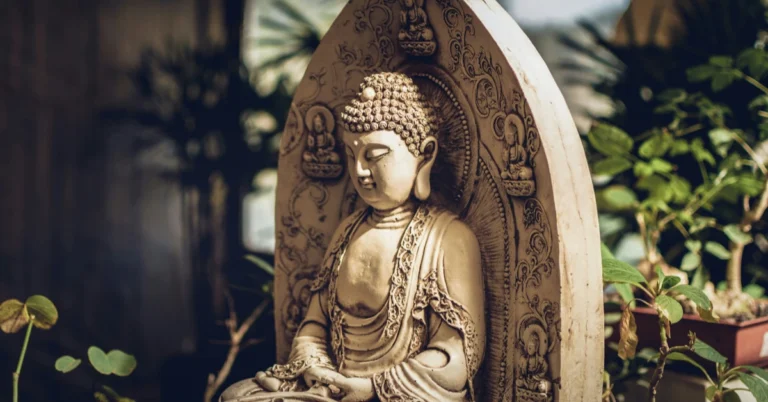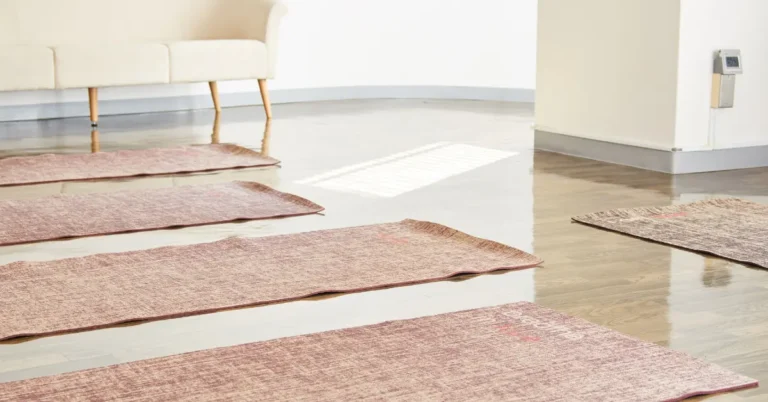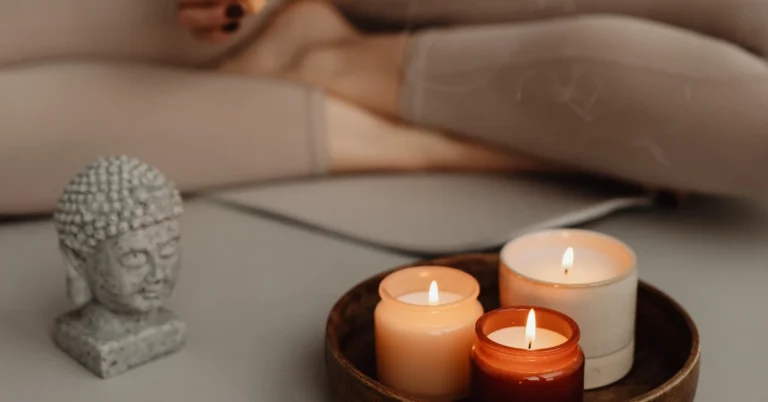I have found that incorporating evening guided meditation into my daily routine has been incredibly beneficial for my mental health and overall wellbeing. Taking just a few minutes each night to clear my mind and focus on positive affirmations has helped me to let go of any stress or anxiety from the day and prepare for a restful night’s sleep.
Evening guided meditation typically involves finding a quiet and comfortable space, closing your eyes, and listening to a guided meditation recording or following along with a set of affirmations. These meditations often focus on relaxation, gratitude, and letting go of negative thoughts or emotions. By practicing this type of meditation regularly, individuals may experience reduced stress levels, improved sleep quality, and increased feelings of inner peace and contentment.
With a wide range of resources available online, it has never been easier to get started with this simple yet effective practice. I will show you how…
You want to practice more self care and need a special gift for your beloved ones? With those 50 affirmation cards you are good to go ✨.
Importance of Evening Guided Meditation
As someone who has been practicing meditation for years, I can confidently say that evening guided meditation is an essential part of my daily routine. It helps me wind down after a long day and prepares me for a restful night’s sleep.
One of the primary benefits of evening guided meditation is that it helps reduce stress and anxiety. When we meditate, we activate the parasympathetic nervous system, which is responsible for the “rest and digest” response. This helps us feel more relaxed and calm, which is especially important after a busy day.
Another benefit of evening guided meditation is that it can improve the quality of our sleep. When we are stressed, it can be challenging to fall asleep and stay asleep. However, meditation can help us quiet our minds and relax our bodies, making it easier to drift off into a peaceful slumber.
In addition to reducing stress and improving sleep, evening guided meditation can also help us cultivate a sense of gratitude and positivity. By focusing on the present moment and letting go of worries about the past or future, we can appreciate the good things in our lives and feel more content.
Overall, I believe that evening guided meditation is an essential part of a healthy self-care routine. It can help us reduce stress, improve sleep, and cultivate a sense of gratitude and positivity. If you haven’t tried it yet, I highly recommend giving it a shot and seeing how it can benefit you.
Understanding Evening Guided Meditation

Concept and Principles
As someone who practices evening guided meditation, I understand the importance of having a clear understanding of what it is and how it works. Guided meditation is a form of meditation where you are led by an instructor or a recording to help you focus and relax. It is a great way to start meditating, especially if you are new to the practice.
The concept of guided meditation is based on the principles of mindfulness and relaxation. It helps you to focus your attention on your breath and your body, which can help you to relax and let go of stress and anxiety. By focusing on your breath, you can quiet your mind and let go of negative thoughts and emotions.
Benefits
There are many benefits to practicing guided meditation, especially in the evening. Here are some of the benefits that I have experienced:
- Helps to reduce stress and anxiety
- Promotes relaxation and better sleep
- Improves focus and concentration
- Enhances self-awareness and mindfulness
- Boosts mood and overall well-being
Guided meditation can be a powerful tool to help you manage stress and anxiety, which can be especially helpful in the evening when you are winding down from the day. It can also help you to get a better night’s sleep, which is important for overall health and well-being.
I hope you now understanding the concept and principles of guided meditation is important to get the most out of your practice. The benefits of guided meditation are numerous, and it can be a great way to relax and unwind in the evening.
Steps for Evening Guided Meditation

Preparation
Before starting the evening guided meditation, I find it helpful to prepare my environment to create a calming atmosphere. This includes dimming the lights, lighting candles, and playing soft music. I also make sure to wear comfortable clothing and sit in a comfortable position.
Next, I set an intention for my meditation practice. This intention could be anything from letting go of stress to cultivating gratitude. Setting an intention helps me stay focused and grounded during the meditation.
Process
To begin the evening guided meditation, I close my eyes and take a few deep breaths. I then follow the guidance of the meditation teacher, who may lead me through a body scan or visualization exercise.
Throughout the meditation, I focus on my breath and try to let go of any distracting thoughts. If my mind starts to wander, I gently bring my attention back to my breath.
Towards the end of the meditation, I spend a few minutes in silence, allowing myself to simply be present in the moment. When the meditation is over, I take a few more deep breaths and slowly open my eyes.
After the meditation, I take some time to reflect on my experience. I may journal about any insights or emotions that came up during the practice. I find that this reflection helps me integrate the benefits of the meditation into my daily life.
Overall, the process of evening guided meditation can be a powerful tool for reducing stress and promoting relaxation. By creating a calming environment and setting an intention, I am able to fully immerse myself in the practice and reap the benefits of a peaceful mind and body.
Common Mistakes and Solutions for Evening Guided Meditation

As with any meditation practice, there are common mistakes that can hinder the effectiveness of evening guided meditation. Here are some of the most common mistakes and solutions to help you get the most out of your practice:
Mistake: Not finding a quiet space
Solution: It’s important to find a quiet and comfortable space for your evening guided meditation practice. This can be a separate room or just a corner of your bedroom. Make sure the space is free from distractions, such as electronic devices and noise. If you live in a noisy environment, consider using earplugs or noise-cancelling headphones to help you focus.
Mistake: Not setting an intention
Solution: Setting an intention for your evening guided meditation can help you focus and get the most out of your practice. Before you begin, take a few moments to think about what you want to achieve through your meditation. This can be as simple as wanting to feel more relaxed or wanting to let go of stress from the day.
Mistake: Not being consistent
Solution: Consistency is key when it comes to any meditation practice. It’s important to set aside time each day for your evening guided meditation practice. Even if you only have a few minutes, try to make it a daily habit. This will help you build momentum and make it easier to stick to your practice in the long run.
Mistake: Not being patient
Solution: It’s important to remember that meditation is a practice, and it takes time to see results. Don’t expect to feel completely relaxed or stress-free after just one session. Be patient and trust the process. Over time, you will begin to notice the benefits of your evening guided meditation practice.
Mistake: Not using guided meditations
Solution: Guided meditations can be a helpful tool for beginners or anyone who is struggling to stay focused during their evening guided meditation practice. There are many apps and websites that offer guided meditations specifically designed for the evening. Just make sure to choose a guided meditation that resonates with you and your intentions for the practice.
By avoiding these common mistakes and implementing the solutions provided, you can enhance the effectiveness of your evening guided meditation practice and experience the many benefits it has to offer.
Tips for Effective Evening Guided Meditation

As someone who has been practicing evening guided meditation for years, I have found that there are a few key tips that can help make the experience more effective and enjoyable. Here are my top recommendations:
1. Find a quiet and comfortable space
It’s important to find a space where you can relax and focus without distractions. This could be a quiet room in your home, a peaceful outdoor location, or even your bed. Make sure you have a comfortable surface to sit or lie down on and that the temperature is comfortable.
2. Use headphones
Using headphones can help block out external noise and distractions, allowing you to fully immerse yourself in the guided meditation. It can also enhance the audio quality, making it easier to hear and follow along with the instructions.
3. Set an intention
Before beginning your meditation, take a moment to set an intention for the session. This could be something as simple as “I want to relax and let go of stress” or something more specific like “I want to cultivate feelings of gratitude and positivity.” Setting an intention can help you stay focused and engaged throughout the practice.
4. Focus on your breath
One of the key components of guided meditation is focusing on your breath. As you listen to the instructions, try to sync your breath with the guidance. This can help calm your mind and relax your body.
5. Let go of expectations
It’s important to approach guided meditation with an open mind and without expectations. Don’t worry if your mind wanders or if you don’t feel any immediate effects. Remember that meditation is a practice, and the benefits may not be immediately apparent.
By following these tips, you can make the most out of your evening guided meditation practice and reap the many benefits it has to offer.
Through evening guided meditation, we can also enhance our focus and creativity, allowing us to approach the next day with a clear mind and positive attitude. It can help us release whatever our thoughts may be circling on and ease into restful sleep.
It is important to note that there is no one-size-fits-all approach to meditation. It may take some time to find the right technique or style that works best for you. It is also important to be patient with yourself and not get discouraged if you do not see immediate results. Of course you can also try other forms of meditation.
Incorporating evening guided meditation into our daily routine can have a profound impact on our overall well-being. It can help us feel more grounded, centered, and at peace. So why not give it a try and see how it can benefit you?
Have a good evening and enjoy your meditation 🌙.
FAQ
How can evening guided meditation help with anxiety?
Evening guided meditation can be an effective tool for managing anxiety. By focusing on your breath and the present moment, you can quiet your mind and reduce feelings of anxiety and worry. Additionally, practicing evening guided meditation regularly can help you develop a greater sense of mindfulness and self-awareness, which can help you better manage your anxiety over time.
What are some popular evening guided meditation techniques?
There are several popular techniques for practicing evening guided meditation, including body scan meditation, loving-kindness meditation, and mindfulness meditation. Body scan meditation involves focusing on each part of your body and releasing tension, while loving-kindness meditation involves sending positive thoughts and feelings to yourself and others. Mindfulness meditation involves focusing on your breath and the present moment.
Can guided meditation be effective even if you fall asleep during the session?
Yes, guided meditation can still be effective even if you fall asleep during the session. The intention of the practice is to help you relax and let go of stress and tension, so if you fall asleep, it’s a sign that your body and mind needed rest. However, if you find that you consistently fall asleep during your evening guided meditation sessions, you may want to consider practicing at a different time.
How long should an evening guided meditation session last?
The length of an evening guided meditation session can vary depending on your preferences and schedule. Some people prefer shorter sessions of 10-15 minutes, while others may prefer longer sessions of 30 minutes or more. It’s important to find a length that works best for you and your needs.
We are very happy you now know about evening guided meditation. We’d love to hear your thoughts and experiences. Share your insights with us in the comments below!






